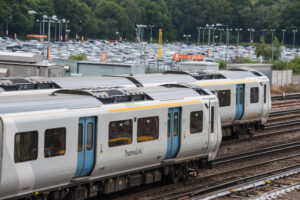
It has become one of the great post-pandemic riddles of the railway: how to entice commuters back to the office on Mondays and Fridays.
Rail operators have been grappling with the modern era of Tuesday, Wednesday and Thursday workers, which has hit them hard, causing a collapse in sales of season tickets and a loss of overall revenue.
The conundrum has prompted Govia Thameslink Railway (GTR), Britain’s biggest rail operator, to start selling discounted peak tickets on some Southern services on the first and last days of the working week in the hope of enticing passengers to change their travel patterns.
It will begin selling advance tickets on some services during the morning and evening peaks, saving commuters up to 15 per cent. Passengers with railcards will be able to save a further third.
The company said its morning peak commuter numbers were stubbornly 70 per cent below pre-Covid levels, with Friday being the quietest day on the network.
Monday morning peak services carry only about 210,000 passengers, compared with between 230,000 and 250,000 on each of the middle three days of the working week. On Fridays, which were quieter even before the pandemic began, the figure drops to about 160,000.
Jenny Saunders, GTR’s customer services director, said: “We’ve seen a sea change in travel habits because of the pandemic. Mondays and Fridays are unsurprisingly less popular with our customers because they bookend the week, but our trains are quieter as a result, so we want more people to use them.
“Lower ticket prices, coupled with Southern’s new loyalty rewards scheme, will encourage people back to rail at times when we have more space on board and they’ll help with the rising cost of living. We really hope both trials will be a success.”
Advance tickets, which are cheaper than walk-up fares, previously have been available only for off-peak services, aimed at leisure passengers. They can be bought up to 12 weeks in advance of travel, with a cut-off of 6pm the night before departure.
The trial tickets will be on offer for some services in both directions between three big London stations — Victoria, Clapham Junction and East Croydon — as well as stations south from Three Bridges in West Sussex. This extends as far east as Eastbourne in East Sussex and as far west as Chichester in West Sussex.
A commuter living in Worthing on the south coast, travelling to London Victoria, for example, will be able to buy an advanced peak return for £56.20, compared with £66.20 for an anytime day return. The biggest catch is that advance ticket-holders must travel on a specific service, while passengers who buy an anytime day return can board any train.
GTR is also testing a loyalty scheme that enables passengers to collect points that can be redeemed for rewards such as days out, cinema tickets and coffee.
Across the network, average passenger numbers have recovered in the past year, especially in terms of off-peak leisure travel, but overall revenue is stuck at 80 per cent of pre-pandemic levels, largely because of the collapse in the number of season ticket-holders.
The Department for Transport has tight control over the financial decisions of most train operators in England after taking on their costs and revenue risks to maintain services since the start of the pandemic.
Read more:
Govia Thameslink launches cheaper fares on Mondays to lure train back commuters





